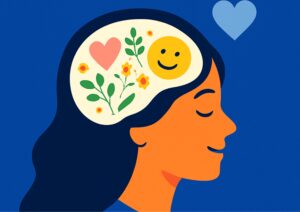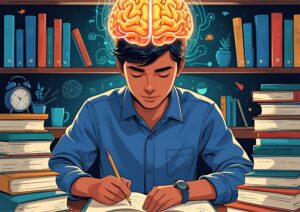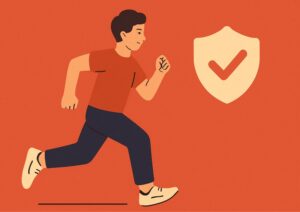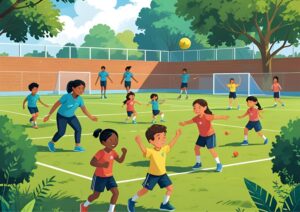Nowadays, technology is what keeps our world going, and exercise comes second. Riding to school in cars, staying in class all day, or bending over desks could make the importance of physical education even more vital for kids. Physical education is not another class—its foundation of growth makes kids stronger, smarter, and builds life skills they can use for the rest of their lives.
This article discusses the importance of physical education, its influence on parents and children, and how it prepares kids for long-term success in school and life.
What Is Physical Education?

Physical education (PE) is a school course that combines movement, exercise, fitness, and sports. It is not merely lap running or playing games. It is the systematic organization for:
- Building physical fitness
- Practicing teamwork and cooperation
- Building motor skills and coordination
- Promoting healthy habits during one’s lifetime
Schools with a strong emphasis on PE instill a culture of determination, discipline, and respect—values that define students throughout their lives. Understanding the importance of physical education starts here.
The Importance of Physical Education in a Student’s Life
1. Promotes Physical Wellness

One of the most apparent yet most compelling advantages of PE is enhanced physical well-being. With obesity and inactivity in children becoming increasingly common, the importance of physical education is an essential element of disease avoidance, and it also diminishes dangers for diabetes, high blood pressure, and heart illness. Exercise facilitates:
- Stronger bones and muscles
- Better posture and flexibility
- Maintenance of a healthy body weight
- Increased immunity
Those who cultivate these habits early in life will probably have a healthier adult life.
2. Enhances Mental Health

The importance of physical education reaches far beyond the physique—it does good for the mind as well. Physical activity results in the release of endorphins, the body’s own stress fighters, which ease anxiety and improve mood. Active involved students in PE:
- Have less academic stress
- Enhance concentration and attention span
- Build strength of will and resilience
- Build improved sleeping habits
This optimistic attitude not only improves school studies but also builds self-confidence.
3. Improves Academic Performance

Other parents worry that sports and physical education will divert children from studies. In fact, research proves the opposite. Students participating in PE do the following:
- Improved information retention
- Improved problem-solving abilities
- More active participation in class
- Improved test scores
By increasing cerebral blood flow, PE increases learning efficiency and sustains academic performance. This makes the importance of physical education directly tied to better learning outcomes.
4. Develops Social and Life Skills

Physical education is also an important developer of social skills. Team sports, group assignments, and sports activities enable learners to acquire:
- Teamwork and leadership
- Effective communication
- Sportsmanship—graceful adjustment to winning and losing
- Goal-setting and achievement
These life skills equip learners for their future career, relationships, and roles of leadership. Recognizing the importance of physical education here shows its long-term impact on personality and character.
5. Develops Discipline and Character

Apart from fitness, the importance of physical education is evident in building discipline and strong character. Through repetition of habits, rules, and perseverance in activities, students acquire:
- Time management
- Patience and persistence
- Respect for authority and for others
- Responsibility for what they do
These are the qualities that make responsible and well-rounded citizens.
Why Parents Have to Support Physical Education

Parents tend to usually prioritize academics most, but supporting PE is just as significant. Supporting active involvement assists children in:
- Avoid excessive screen time
- Acquire leadership abilities
- Achieve balance between academics and physical living
- Establish habits for a lifetime of fitness
Parent support ensures the importance of physical education is understood at home, helping children shape a healthy mind-body balance that fosters overall growth.
The Contributions of Schools to Physical Education Support

Schools are the most significant institutions where children get formal physical training. To put greatest emphasis on the importance of physical education, schools must:
- Assign adequate time for PE periods
- Offer secure playgrounds and sporting apparatus
- Encourage participation in competitions
- Offer education on diet and overall well-being
By doing this, schools foster the overall development of the students.
Physical Education Long-Term Benefits

The benefits of PE last far beyond the school years. The physically active students who continue into adulthood are more likely to:
- Practice healthy fitness habits as adults
- Reduce their risk for illness-related diseases of lifestyle
- Exhibit enhanced interpersonal and leadership skills
- Adjust more readily to life and employment challenges
In short, the importance of physical education brings about lifelong habits that result in health, character, and achievement.
Conclusion
The importance of physical education cannot be ignored. It is not merely a respite from book learning because it is the very essence of education overall. Increased physical fitness, better mental health, enhanced scholastic performance, and the learning of life skills and self-discipline are all formed by PE through shaping students into capable, courageous, and resilient individuals.
For kids, it develops lifelong habits. For parents, it provides balanced growth. And for schools, it is a commitment to educating children for life—body, mind, and spirit.
FAQs on Importance of Physical Education
- Why is physical education crucial in schools?
It enhances physical fitness, concentration, and life skills and is therefore an integral part of learning. - How does physical education help in academic achievement?
Regular physical exercise reinforces concentration, memory, and problem-solving skills and leads to improved school performance. - What are the life skills one learns through physical education?
It develops teamwork, discipline, leadership, time management, and perseverance—life skills. - How can parents reinforce physical education at home?
By encouraging outdoor play, restricting screen time, and exercising as a family. - What are the long-term benefits of physical education?
It reduces risks to lifestyle diseases, enhances resilience, and establishes lifelong health and fitness patterns.
It reduces risks to lifestyle diseases, enhances resilience, and establishes lifelong health and fitness patterns.
